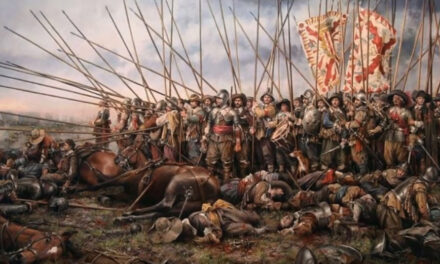Welcome to a Revelation of Jesus. In the previous video we saw that at the climax of the Book of Revelation the focus is on Jesus, the Lamb of God, and with Him, His 144,000 last-day messengers. In this video, we will start to look at the messages that they have to give to the world. More specifically, we will explore the seemingly conflicting mandate in the message to “fear God”.
—
“[John] saw another angel flying in the midst of heaven, having the everlasting gospel to preach to those who dwell on the earth” (Revelation 14:6). John has already seen many angels in his vision. In previous videos we saw that some of them were God’s heavenly angels sent to do His bidding, some were evil angels carrying out Satan’s agenda, and some were symbolic of human messengers. This particular angel has “the everlasting gospel to preach to those who dwell on the earth”. This immediately alerts us that these angels are symbolic of human messengers, because God specifically tasked His followers to “Go into all the world and preach the gospel to every creature” (Mark 16:15).
In Matthew 24 where Jesus told us what to expect during the time of the end He said, “this gospel of the kingdom will be preached in all the world as a witness to all the nations, and then the end will come” (Matthew 24:14). There is no intimation here or anywhere else that Jesus will eventually get tired of waiting for His disciples to take the gospel to the world and will let angels take over. We can conclude that the angels of Revelation 14 who “have the everlasting gospel to preach to those who dwell on the earth” symbolize the followers of Jesus, and specifically, the 144,000 who were described in the previous five verses of chapter 14.
—
The angels are flying “in the midst of heaven.” There are three heavens in the Bible: the atmosphere, the heaven of the stars, and the heaven where God and the angels reside. According to Revelation 19:17, the “midst of heaven” is the atmosphere where the birds fly. This shows us that the gospel proclamation of Revelation 14 will be so widespread and conspicuous that it will be impossible to ignore. The universality of the message is underscored by the fact that it is directed “to every nation, tribe, tongue, and people” (Revelation 14:6). Remember, Jesus said in Matthew 24 that “The end will come [when]… the gospel of the kingdom [is] preached… to all nations,” (Matthew 24:14). Here we see the gospel preached “to every nation, tribe, tongue, and people.” The obvious conclusion is that this is the final proclamation of the gospel during the time of the end, just before the Second Coming of Christ.
—
The final message begins with “the everlasting gospel” (Revelation 14:6). The Greek word for gospel simply means good news, and there is lots of good news in the Bible. But in the New Testament the word “gospel” refers to specific good news that is summarized in 1 Corinthians 15. The apostle Paul writes to the people of Corinth, “I want to remind you of the gospel I preached to you, which you received and on which you have taken your stand, by which also you are saved” (1Corinthians 15:1). This verse tells us that the gospel is the very center of our Christian faith.
Paul begins his exposition of the gospel by reminding us “that Christ died for our sins” (1 Corinthians 15:1). Christ’s death on the Cross for our sins is absolutely essential for our salvation because “all have sinned” and “the wages of sin is death” (Romans 3:23, 6:23). Without His death we remain “dead in trespasses and sin” “having no hope and without God in the world.” But “In Him we have redemption through His blood, the forgiveness of sins” (Ephesians 2:1, 12,5, 1:7). We could talk or even argue all day about what Christ accomplished with His death on the Cross, whether He “paid our debt” or “satisfied the demands of the law” or “took upon Himself punishment that we deserved.” Whatever metaphor we use is totally inadequate. What we can know, very simply, is “that Christ died for our sins.”
But Christ’s death on the cross is not the end of the good news. Forgiveness of sins frees us from the bondage of guilt and shame, but if all we had to look forward to was the remainder of our life in this dark world followed by inevitable and final death, the good news would be incomplete. Paul underscores this as he continues: “If Christ has not been raised, your faith is futile and you are still in your sins… But in fact, Christ has been raised from the dead, the first fruits of those who have died (1 Corinthians 15:17,20). The resurrection of Jesus ensures us of life beyond the grave and a place in His glorious kingdom for those who accept His sacrifice on their behalf.
Paul assures us that there is more good news, even as we are waiting for His kingdom of glory. “He must reign till He has put all enemies under His feet” (1Corinthians 15:25). Jesus did not return to heaven and leave us here to fend for ourselves. He is reigning, interceding to answer the prayers of those who have accepted Him and sending His Spirit to help and call those who have not. Jesus is patient, not wanting anyone to end up “under his feet” with His enemies. Even His tolerance of Satan and his wicked plans and initiatives is a part of what He is doing to make evil permanently unthinkable, ensuring an eternity without the prospect of a recurrence of sin.
Paul’s exposition of the gospel concludes, “The end will come, when he will turn the Kingdom over to God the Father, having destroyed every ruler and authority and power” (1 Corinthians 15:24,26). “Then “there will be no more death or sorrow or crying or pain. All these things [will be] gone forever” (Revelation 21:4).
—
We can rejoice at this good news, but we should keep in mind that the message of the everlasting gospel appears at the climax of the second half of Revelation, the theme of which is God’s victory over Satan, sin, and death. As such, it is the opening salvo against Satan’s misinformation campaign that is so prominent in the first half of Revelation. The everlasting gospel is actually the number one target of Satan’s attacks because it is the roadmap of salvation, showing us all that God has done, is doing, and will do, not just to save us, but to rid the universe of all evil. You may want to review video 35 which outlines Satan’s war against the gospel during the Middle Ages. The Roman Catholic Church developed a theology that obscured the gospel, asserting that ritualized performance of what we have to do, along with what the priests do, and what the church does, are the means of salvation.
The Protestant Reformation shed major light on the concept of righteousness by faith and a personal relationship with Jesus, but Satan did not give up his attempts to minimize or distort the gospel. The modern Christian Church often teaches a narrow gospel of personal salvation: that Jesus died to pay the penalty for our sins and give us a ticket to heaven, which we receive when we repent and confess our sins to Him, period. Although we can never minimize the importance of Christ’s death, the fullness of the gospel, as we saw in 1Corinthians 15, also teaches that we are no longer slaves of sin because we have been resurrected with Christ into newness of life, in which “God works within us both to will and to do according to His good pleasure” (Philippians 2:13). We also saw that a part of the everlasting gospel is that Jesus reigns at the right hand of the Father, putting every enemy under his feet, both the enemies that seek to destroy us personally, and also those that seek to hold the world captive. And finally, the gospel teaches that God will not allow evil to continue indefinitely; Jesus will come again and “the end will come when [Jesus] puts an end to all rule and all authority and power… the last enemy that will be destroyed is death… and God will be all in all” (1Corinthians 15:24-28).
We see then that the everlasting gospel is comprehensive; It takes in everything that God has done, is doing, and will do to save the universe from the pandemic of evil.
—
The gospel is called “everlasting” because it was not an afterthought or an emergency plan devised in response to the appearance of sin. Jesus is “the Lamb slain from the foundation of the world” (Revelation 13:8). When God the Father, Son and Holy Spirit created angels and humans with free will and the possibility of choosing evil, He also made the provision that the Father would give “His only begotten Son” so that sinners who deserve death can instead receive life. The gospel was first announced when God told Satan in the Garden of Eden, “[I will] put enmity between you and the woman, and between your seed and her Seed” (Genesis 3:15). It was taught symbolically by the Old Testament sanctuary services. Taking the gospel to the world was the job description that Jesus left for His followers to accomplish. And the final message to the world begins and ends with a mighty proclamation of the everlasting gospel.
Considering that the first angel has the good news of the everlasting gospel to preach to the world, the actual message at first glance seems baffling: “Fear God and give glory to Him, for the hour of His judgment has come” (Revelation 14:7). This seems incongruous. A command to fear any other person would mean to be afraid of them, which hardly seems like good news.
—
All through the scriptures, we find seemingly contradictory messages: “fear God” and “do not fear”. For example, in Luke 12:5 Jesus said, “I will show you whom you should fear: fear Him (that is, God) who, after He has killed, has power to cast into hell; I say to you, fear Him!” But then a few verses later He said, “Do not fear, little flock, for it is your Father’s good pleasure to give you the kingdom” (Luke 12:32).
This apparent contradiction highlights the fact that there are two different kinds of “fear of the Lord” described in the Bible. Unbelievers and those who are disobedient should fear God because of the judgment they are bringing upon themselves. God’s abhorrence of sin and its resulting pain, suffering and death is such that He cannot let sin exist forever, even though its destruction means judgment and death for His beloved children who refuse to let go of it. We should not think that God has picked out some behaviors he doesn’t happen to like and lashes out to punish those who dare to disobey Him. Death is inherent in sin. God, in love for all who suffer together from the results of sin, will eliminate evil and everything connected to it. This is why Jesus said, “Fear Him who is able to destroy both body and soul in hell” (Matthew 10:28). God in the final judgment will bring sin to an end, and because of this, people who cling to sin should be afraid.
—
Those who believe the Gospel do not have to be afraid of judgment. Jesus said, “He who hears My word and believes in Him who sent Me has everlasting life, and shall not come into judgment, but has passed from death into life” (John 5:24). But even those who love God and believe in Jesus still need the fear of the Lord.
“If you, Lord, should mark iniquities, O Lord, who could stand? But there is forgiveness with You, that You may be feared” (Psalms 130:3,4). This is the fear that recognizes that even though I am a believer, I am also a sinner, and but for God’s grace I would be just as hopelessly lost as any murderer, rapist, or thief on earth. “Let us fear the Lord our God, who gives autumn and spring rains in season, who assures us of the regular weeks of harvest” (Jeremiah 5:24). This is the fear that recognizes that I am totally dependent upon Him for my very existence. “The fear of the Lord is to hate evil: Pride and arrogance and the evil way” (Proverbs 8:13). This is the fear that recoils and runs from sin, which has blighted our lives and destroyed the lives of those we love
—
Most of all, the fear of the Lord is the knowledge that God has given me the gift of free will, and I am but a simple decision away from turning my back on the Lord and plunging back onto the road of pain, sorrow and death that the devil would like to lure me onto. God said through Jeremiah, “I will put My fear in their hearts so that they will not depart from Me” (Jeremiah 32:40). The beauty of this verse is that the fear of God is not something we conjure up. It is a gift of grace, like faith, hope, and love.
—-
If you were blessed by this video, I would appreciate it if you would like it, share it with someone, and subscribe to my YouTube channel; that really encourages me to keep on making more videos.
Order the book “A Revelation of Jesus”
A Revelation of Jesus by David Lackey is available from Barnes and Noble (free shipping), Amazon, and many other bookstores.
ISBN-13: 978-1479603923










